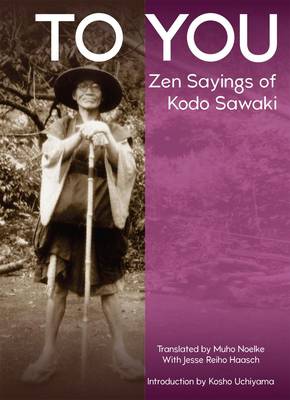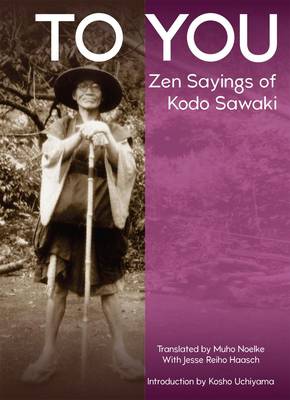
- Retrait gratuit dans votre magasin Club
- 7.000.000 titres dans notre catalogue
- Payer en toute sécurité
- Toujours un magasin près de chez vous
- Retrait gratuit dans votre magasin Club
- 7.000.000 titres dans notre catalogue
- Payer en toute sécurité
- Toujours un magasin près de chez vous
Description
Kodo Sawaki Roshi [1880-1965] was commonly referred to as "Homeless Kodo" due to his nomadic lifestyle. In the tradition of Soto Zen, which emphasizes zazen (sitting meditation practice) above the use of texts and koans, he is one of the most influential teachers of the twentieth century. In this book, hundreds of pith sayings taken from his wide-ranging teachings have been carefully compiled and grouped according to subject by one of his closest students.
The reader is easily struck by Sawaki's sincerity, depth and directness. What comes across so immediately is his uncompromising dedication to zazen and his determination to transmit an authentic practice. This he does by pointing out, with biting accuracy, the many pitfalls we "ordinary humans" stumble into. His teaching is at the same time both completely faithful to the Buddhist ancestors and absolutely relevant to our many modern predicaments. Are you worried about your career? Fighting with your spouse? Concerned about money? Complaining about how busy you are? Homeless Kodo has a piece of advice for you.
Kodo Sawaki Roshi also has an appeal to those who are decidedly irreligious, in his irreverence and criticism of hollow traditions. He ruthlessly challenges political and societal conformity, consistently referring his readers back to the essence tenets of zen.
Very few of his works have been translated into European languages. Of all his books, perhaps it is this one, To You, (enthusiastically received in both French and German) which best captures his contribution to the tradition.
While Kodo Sawaki Roshi is still a lesser-known teacher in the West, some of his disciples, most notably Kosho Uchiyama Roshi (who collected these sayings) and Taisen Deshimaru Roshi both had many Western disciples, who in turn have brought the practice to literally hundreds of centers and thousands of practitioners in North America, South America and Europe.
This English-language version is a joint effort by a distinguished team of Zen practitioners and translators: Muho Noelke and Reiho Jesse Haasch. Muho previously translated the Japanese version into German, and is the first Westerner to hold the post as abbot of a major Japanese Zen monastery, Antaiji. There, Kodo Sawaki himself also served as the abbot from 1949 until his death in 1965.
The reader is easily struck by Sawaki's sincerity, depth and directness. What comes across so immediately is his uncompromising dedication to zazen and his determination to transmit an authentic practice. This he does by pointing out, with biting accuracy, the many pitfalls we "ordinary humans" stumble into. His teaching is at the same time both completely faithful to the Buddhist ancestors and absolutely relevant to our many modern predicaments. Are you worried about your career? Fighting with your spouse? Concerned about money? Complaining about how busy you are? Homeless Kodo has a piece of advice for you.
Kodo Sawaki Roshi also has an appeal to those who are decidedly irreligious, in his irreverence and criticism of hollow traditions. He ruthlessly challenges political and societal conformity, consistently referring his readers back to the essence tenets of zen.
Very few of his works have been translated into European languages. Of all his books, perhaps it is this one, To You, (enthusiastically received in both French and German) which best captures his contribution to the tradition.
While Kodo Sawaki Roshi is still a lesser-known teacher in the West, some of his disciples, most notably Kosho Uchiyama Roshi (who collected these sayings) and Taisen Deshimaru Roshi both had many Western disciples, who in turn have brought the practice to literally hundreds of centers and thousands of practitioners in North America, South America and Europe.
This English-language version is a joint effort by a distinguished team of Zen practitioners and translators: Muho Noelke and Reiho Jesse Haasch. Muho previously translated the Japanese version into German, and is the first Westerner to hold the post as abbot of a major Japanese Zen monastery, Antaiji. There, Kodo Sawaki himself also served as the abbot from 1949 until his death in 1965.
Spécifications
Parties prenantes
- Auteur(s) :
- Editeur:
Contenu
- Nombre de pages :
- 236
- Langue:
- Anglais
Caractéristiques
- EAN:
- 9781942493709
- Date de parution :
- 01-10-21
- Format:
- Livre broché
- Format numérique:
- Trade paperback (VS)
- Dimensions :
- 126 mm x 176 mm
- Poids :
- 204 g







